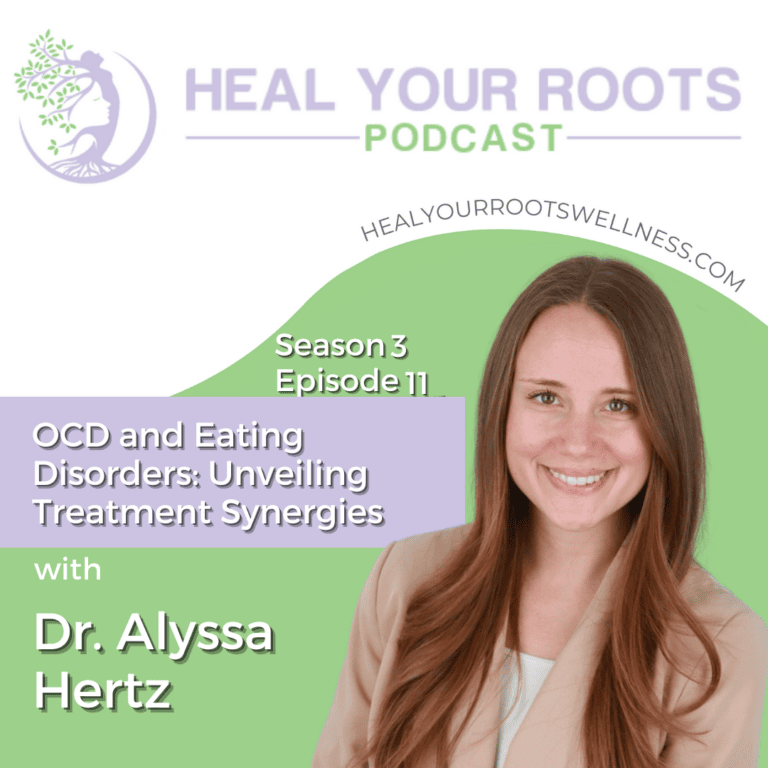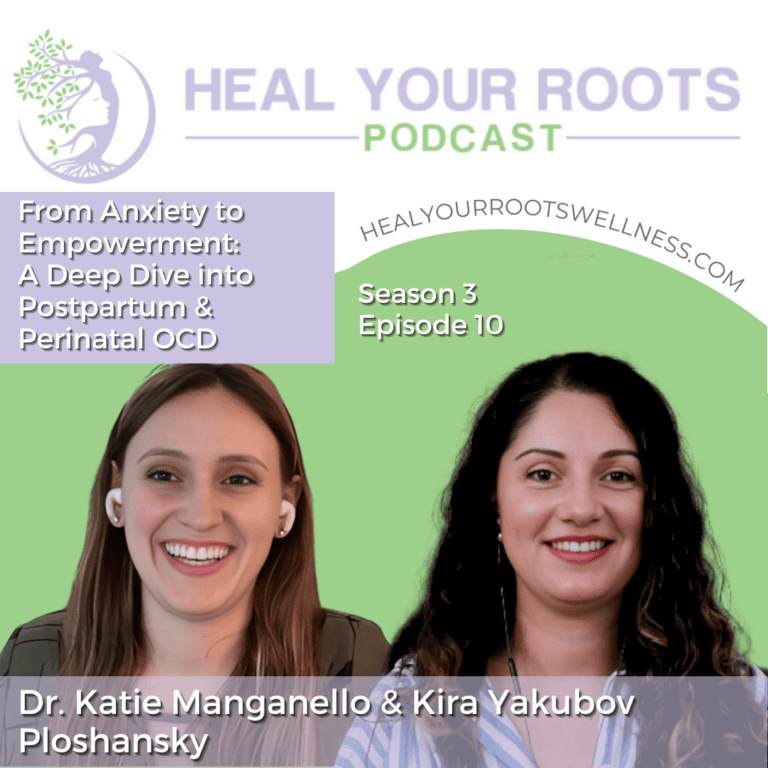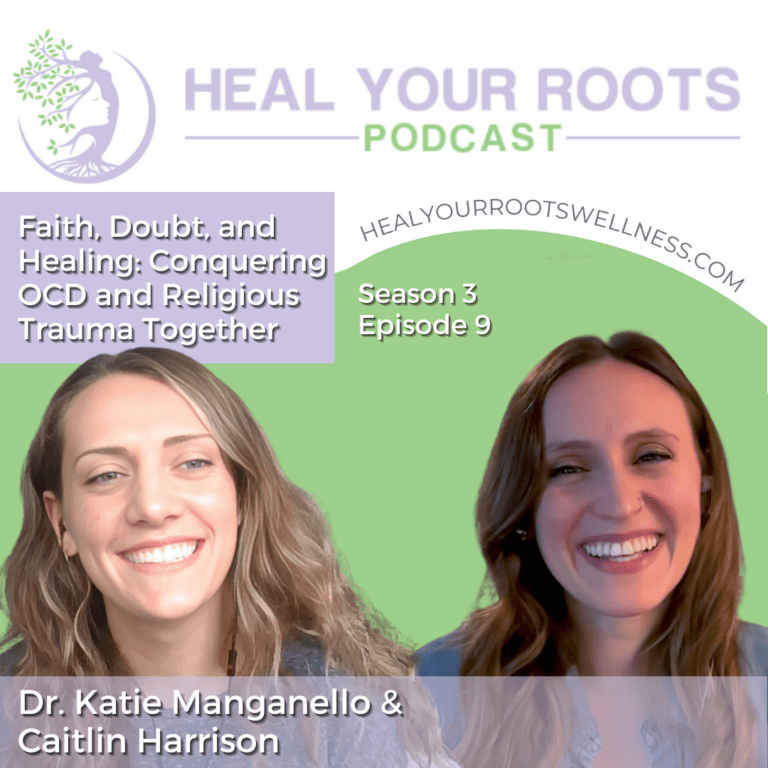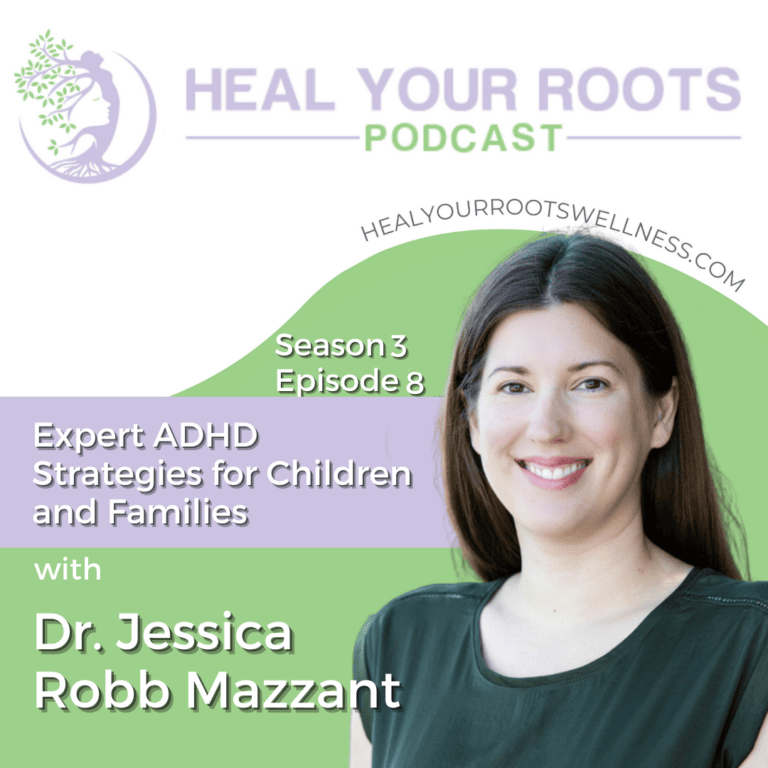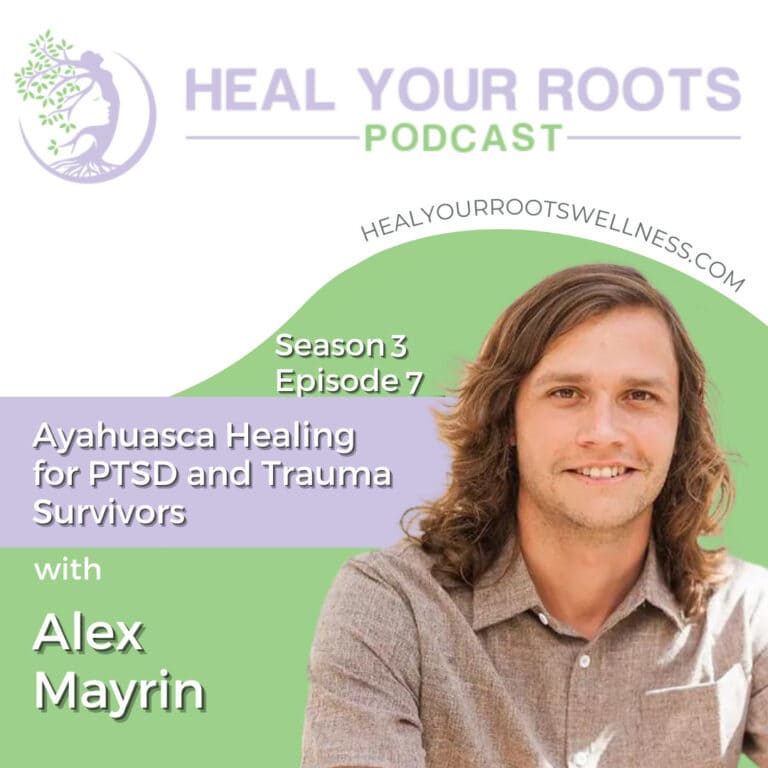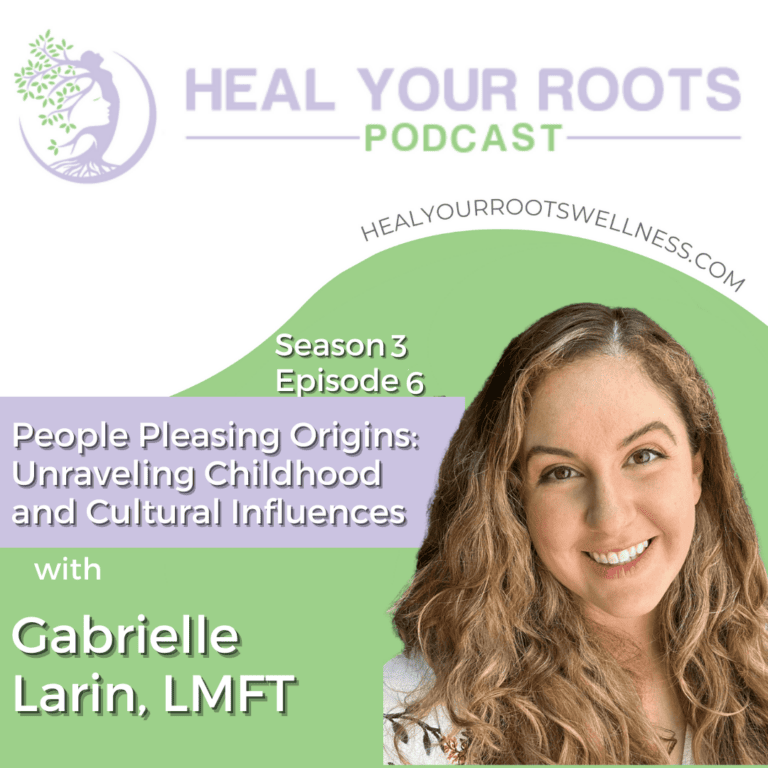Embracing Cultural Identity in Therapy with Gabrielle Larin, LMFT
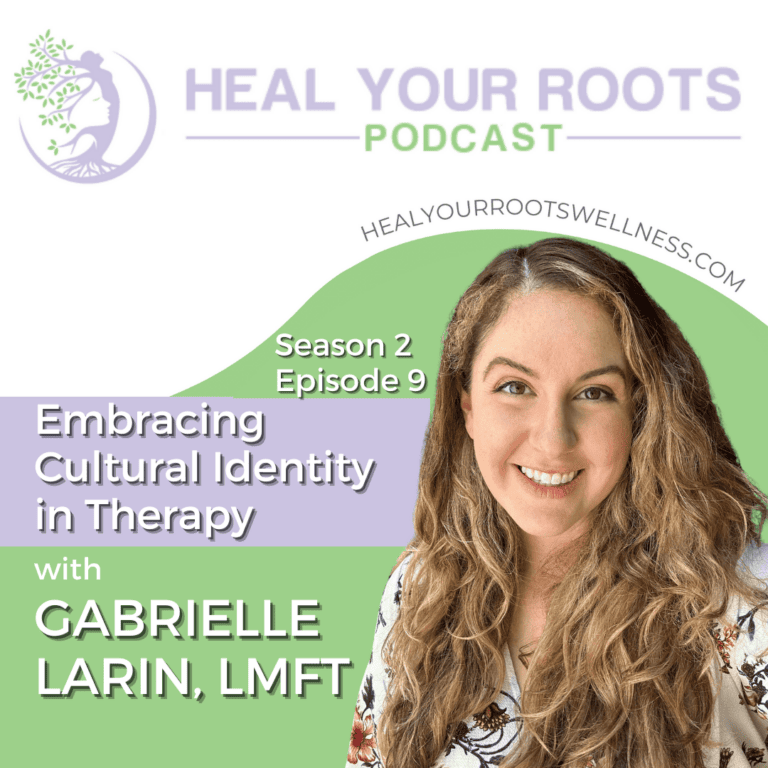
In this insightful episode of the Heal Your Roots Podcast, we have the privilege of hosting Gabrielle Larin, LMFT, a dynamic new addition to the Heal Your Roots Wellness team. Gabrielle shares her remarkable journey to becoming a therapist, beginning from her own experiences with therapy as a teenager.
We dive deep into the nuances of celebrating small successes, a philosophy that Gabrielle carries through her practice. As she takes us through her expansive career, she highlights her expertise in various therapy types, with a particular focus on the benefits and challenges of family-based and mobile therapy.
A key theme of our conversation is adaptability – how it plays a crucial role in managing a family’s mental health and why it’s essential to stay nimble in the face of crisis. Gabrielle emphasizes the importance of taking small, consistent steps toward progress, and how celebrating small wins can lead to lasting change.
We touch on the delicate balance between positive and negative aspects in therapy, and how being prepared for the worst-case scenario can help us stay resilient. Gabrielle also brings her unique perspective on the role of cultural identity in therapy, sharing her personal experiences of working with clients from Hispanic and Eastern European backgrounds, and those who struggle with cultural adjustment.
With a special focus on her work with the LGBTQIA+ community, Gabrielle shares her commitment to making therapy a safe, comfortable space for all. She stresses that being open to different cultures not only helps clients feel more comfortable, but also enriches the therapy experience as a whole.
Gabrielle candidly discusses the importance of therapists ‘walking the talk’ and practicing what they preach. We explore the intricacies of working with clients from diverse cultural backgrounds and various mental health diagnoses, and how being intentional and asking the right questions can enhance the therapeutic process.
Our discussion wraps up with a contemplation of the pros and cons of living within the same culture and the significance of understanding the ‘why’ behind our mental health struggles. Gabrielle leaves us with the valuable takeaway that awareness is the biggest first step, and trusting the process is a cornerstone of therapeutic progress.
Join us for this enlightening episode as we delve into the heart of therapy with Gabrielle Larin, and explore how small victories, cultural understanding, and a commitment to authenticity can transform mental health journeys.
How did you become a therapist? 0:00
Celebrate the small successes, not the big successes.
Introduction to Gabrielle Larin, LMFT
Going to therapy from age 15 to 18.
Cultural aspects of therapy.
How she got into the field of mental health. 3:04
Philosophy and love class in grad school.
Worked in different types of therapy.
Finding her favorite type of work.
Family-based therapy and mobile therapy.
Managing a family’s mental health. 7:17
Family-based therapy in a crisis.
The importance of being adaptable and on your feet.
Baby steps, slow and steady.
Celebrating the small successes and the pain.
Balancing the positive with the negative. 12:32
Balancing the worst-case scenario with the positive.
Her cultural background and identity.
Relating to Hispanic and eastern European clients.
Struggling to adjust to a new culture.
Working with the Lgbtqia plus community. 18:23
Therapy is a two-way street.
Being open to different cultures helps people feel comfortable.
Making people feel safe and comfortable in therapy.
Creating a safe, comfortable space.
Talking the talk or walk the walk. 22:10
Empowered and confident in yourself and in yourself.
Practice what you preach.
Diverse cultural backgrounds and mental health diagnoses.
Being intentional and asking the right questions.
The pros and cons of living in the same culture. 25:37
The pros and cons of being within the same culture.
The importance of understanding the why.
Awareness is the biggest first step.
Trusting the process is important.
Expand for Podcast Transcript
How did you become a therapist?
Gabrielle Larin 0:00
Ah celebrate those small successes because if we don’t celebrate the small successes, then we’re just setting ourselves up for failure.
Kira Yakubov 0:14
Hi, I’m Kira Yakubov, Licensed Marriage and Family Therapist and Founder of Heal Your Roots Wellness practice. Every episode, we talk with a professional from the mental health field to learn more about their approaches and specialties, and also their journey of becoming a therapist. In this podcast, we’ll uncover a deeper look at the world of therapy from new perspectives. You’ll meet the therapist of Heal Your Roots Wellness practice, and trusted colleagues from the community tackling mental well being or your go to Network for practical and professional insight in mental health. Subscribe for new episode releases every other Wednesday.
Kira Yakubov 0:56
Come excited for today’s episode, our guest is Gabrielle Larin, Licensed Marriage and Family Therapist and one of our newest therapists that Heal Your Roots Wellness. Gabby, so nice to have you on today.
Gabrielle Larin 1:08
Thank you. It’s great to be here.
Kira Yakubov 1:10
So first thing we always start with is asking the therapists you know, how did you become a therapist? What made you get into the field? And if you can kind of share a little bit of your backstory
Gabrielle Larin 1:20
Part of my personal life, I actually went to therapy from age 15 to 18. And I experienced so much growth through therapy. And I realized that I wanted to help others grow in similar ways.
Kira Yakubov 1:40
That’s awesome. So that’s interesting that it sounds like your parents, I wanted to initially say they allowed you go to therapy. That’s my own cultural background, saying that, but it sounds like your family encouraged that for you. And were were supportive of you going to therapy?
Gabrielle Larin 1:56
Oh, yeah, they, it’s funny, both me and my sister are both working in therapy. She’s a social worker. And we both kind of grew up in this field. And it’s been very open about, you know, going to therapy and talking about therapy. And you know, as you’re saying the cultural aspects, my cultural background, you don’t really talk about it, you know, swept sweep it under the rug type of thing. But you know, therapy is where you talk about things. So it was very helpful to have that space to be open.
Kira Yakubov 2:30
Awesome. Yeah, the cultural aspects definitely has a huge influence and impact on how we kind of view ourselves and feelings and where we feel safe to share a lot of that stuff.
Kira Yakubov 2:41
Yeah. And that’s where I want to be that safe space for people. Yeah. And so what made you pick particularly Marriage and Family Therapy as a focus?
Gabrielle Larin 2:51
I actually, all the classes that I took in undergrad in college, I really loved human sexuality. That was my favorite. And one of my other classes was, I can’t remember what it was called. But it was something about philosophy and love. And I learned a lot in that class. And it was a place that you could really talk about things that I had never talked about before, especially in a classroom environment. It wasn’t really, it was almost like taboo to talk about. So I did like that against kind of space to talk about those things. And that started my attraction towards it.
How Gabrielle Larin got into the field of mental health
Kira Yakubov 3:33
And so for the listeners, we actually met in grad school, in our Marriage and Family courses. And I think we actually had human sexuality together in grad school, which was a funny class. Yeah, but that was like before we kind of talked to each other until the marriage and family specific courses.
Gabrielle Larin 3:48
Right. Right. Yeah, it’s, I like talking about things that like I was saying are kind of taboo, and you’re not really supposed to, quote talk. You know, those types of things. It’s not appropriate, again, quotes. I like talking about those things.
Kira Yakubov 4:05
Yeah. And so what was some of your experience out of grad school, like once you started working and working with whether it was like individuals or couples or families that kind of got you started with that process?
Gabrielle Larin 4:16
I have a wide variety of different types of jobs that I had, I worked in mobile therapy, alternative high school, family based therapy, chemical dependency unit, so basically a rehab at a psychiatric hospital outpatient therapy with children and teenagers, and individual therapy with adults. So kind of all over the place.
Kira Yakubov 4:45
And so what was kind of the I don’t want to say favorite, well, maybe favorite but like, what you kind of took from all those things that made you kind of settle into what you want to focus on now, which we’ll touch on a little bit
Gabrielle Larin 4:57
because I do have such a wide variety of background and experience, I got to really find out what I enjoyed the most and what I feel so passionate about. And I like to work with teenagers and young adults with depression and anxiety and low self esteem. That’s kind of my, I guess, like you’re saying, favorite, it is my favorite to work with. I like to work with all types of people and all groups of people. But those are kind of my specialty.
Kira Yakubov 5:34
And so I know you also when you mentioned, like the mobile therapy and family based therapy, like, that’s pretty tough work. I mean, all of your experiences seem like all over the board, but really intense work, and so different from one another. What was that family therapy like? having everybody in the room
Gabrielle Larin 5:52
family, family based therapy is really intense, it’s what family based therapy is, it’s a step under, when a parent is kind of like I’ve had enough, I really need a break, I’m thinking of either putting this kid in inpatient, or in respite or residential, pretty much just removing from the home. And family base is the kind of last straw of seeing like Will this work. So it’s very intensive, very intentional in you know, you talk about things head on. So that it was intense. I did that for about two years. And then I started being like, alright, this is a lot, maybe I should take a little step back. But I did love it. Because it was intense. For that time, I loved working with the families who, you know, were needing that extra help and extra support, I liked to see the differences. It’s also in an eight month period. So it’s long enough, but it is pretty short. In the long run, you have to do a lot. And I did like seeing the changes from the beginning to the end, you could you could really see a difference. And that felt nice to be a part of making that difference.
Managing a family’s mental health
Kira Yakubov 7:17
Yeah, and I mean, family based, it’s like, it sounds super intense. But just thinking about all those different personalities in the room and like meeting a family while they’re in crisis, basically, and trying to like, alright, we have to work this out, like right now, or pretty soon, or something severe or big is gonna happen. And I’m wondering how how was that for you to see all these different perspectives and like generations kind of working through each other, plus the layer of like, culture on top of that, I’m sure there was different cultures that came through with the families as well.
Gabrielle Larin 7:49
Right, no two people are the same. So it was it’s kind of exciting to see different people interact different types of people interacting, whether within that one family or within different families, it’s kind of like you have to mold to the people that you’re in front of, you have to kind of change your outlook, but how you are working, you have to kind of help them as they need to be helped, not how you want to help you have to meet them where they are at. And it’s a pretty quick adjustment that has to happen. But if you are in that mindset, you kind of just like have to figure it out. And it was very helpful for me to go through that to be able to feel more competent within myself as a therapist.
Kira Yakubov 8:44
Sure. I mean, it sounds like he has to be super adaptable. And on your feet. Like I think sometimes people think that we have like this whole plan laid out and sometimes we do and then we show up the session. It’s like no, that shit’s right out the window. Yeah, you got to be super present and figure out like what is occurring right in front of you, and like managing all of this at once.
Gabrielle Larin 9:08
Right.
Kira Yakubov 9:08
It’s a lot. I imagine that definitely helped, like, confidence wise, especially starting out as a, like, an early on therapist too.
Gabrielle Larin 9:16
Yeah, it was helpful and you know, that Imposter Syndrome still kicks in sometimes, but you know, if i i for myself for a self esteem as we’re talking about, you know, I have to tell myself the if I can handle that I can handle this, you know?
Kira Yakubov 9:32
Absolutely. I feel like you’ve you’ve gone through the worst, not the worst, but the most intense, that everything else kind of seems a little bit easier and more manageable for sure. And so I know you mentioned that the depression anxiety and really working on self esteem with teens and young adults is like really like your sweet spot where you really like to focus in on and enjoy working with. Is there something in particular about that age group or that kind of presenting issue that feels really rewarding
Gabrielle Larin 9:59
that has drawn When, in terms of rewarding, even, as I said, with the family base, it’s great to see the before and after I will work with, with people who, in the past, you know, I’m thinking of that specific example, this one kid had suicidal ideation, he was just down in the dumps, he felt terrible about himself, just no self worth at all. And I’m a huge fan of baby steps, slow and steady. So you can’t rush into that you can’t make someone feel better about themselves just by telling them good things. So it’s like a slow and steady process to help them believe it about themselves. And seeing people and seeing this kid feel slowly, better about himself and seeing his self worth and, and seeing his internal struggle, start to decrease. It’s just so rewarding. And I feel proud of them, when they can do it themselves. And it’s even better when they feel proud of themselves to be able to do it. Because it doesn’t matter if who am I, it doesn’t matter if I’m proud of them. It matters if they are because they’re the ones who are coming here to get that help. And once they can feel proud of themselves for the changes, and that’s where the real work happens.
Kira Yakubov 11:21
That’s beautiful. And it’s like so life changing, right? Like, even if we think about these little tiny baby steps, they may not seem like anything huge, or that impactful, but when we add it up, and with that momentum over time, and then you see this person, their body language, how they talk about themselves, how they interact and relationships, how that changes, it is pretty rewarding and amazing to see.
Gabrielle Larin 11:44
Yes, and you have to show them those baby steps. Because a lot of times people won’t like you’re saying you can’t see it when you’re in it. And it’s easier to see, you know, remember yourself six months ago versus today. So I like to I’m big on praising and kind of like inspiring and showing the positive side. Because of course, you have to be in the pain, you have to be in the sadness and the anger and the frustration and all of those negative emotions, let yourself feel that as well as reminding yourself that, you know, you have to feel those positives, too. And you have to celebrate those small successes. Because if we don’t celebrate the small successes, then we’re we’re just setting ourselves up for failure.
Balancing the positive with the negative
Kira Yakubov 12:32
I love that. It’s balancing the two, right? Because it’s always easy to think of the worst case scenario or how horrible things are. And it’s like, okay, that can be true and is true. But there’s this whole whole other side here that’s positive that we can be grateful for that is also pretty accurate and true happening right now. So it sounds like you’re the biggest cheerleader in the room. And you really help them like see that perspective, in addition to, you know, the shitty things that are coming up and our reality as well
Gabrielle Larin 13:01
Right, you can’t just focus on the positives, because that’s not reality. That’s not real life, you have to feel the pain. And I feel like, I don’t know if you see in that movie, I worked with kids most recently. So that movie, oh my goodness, the moment the emotion, the Pixar movie,
Kira Yakubov 13:18
I know what you’re talking about. I can’t think of the name
Gabrielle Larin 13:20
Inside Out!
Kira Yakubov 13:22
Inside Out.
Gabrielle Larin 13:24
It’s so good. But it’s like you have to feel the sadness in order to appreciate the happiness. And I am a big fan of that. Because you have to feel those negative emotions. You have to allow yourself to experience those things. You can’t hide them, you can’t push them down. You can’t internalize them. You have to let yourself get through that so that you can get to the other side of appreciating the positives in your life.
Kira Yakubov 13:49
Absolutely. I love these cartoons and movies now coming out to like, really personify this stuff for kids. Like I love watching Pixar movies. I’m like, there’s so many rules and values going on in these things that I wish that we had when we were kids instead of like the Disney ones where it was like not the best messages but
Gabrielle Larin 14:10
The prince has to save you. I can save myself!
Kira Yakubov 14:18
So I know that a big part of your identity and how you show up in the room or just like how you are with clients is your background. Would you mind sharing a little bit about your cultural background?
Gabrielle Larin 14:28
My parents are born and raised in Dominican Republic. So I consider myself to be Dominican American. I speak Spanish although I don’t in sessions, and I go to Dominican Republic to visit my family at least once a year when I was little I would go for five weeks at a time. But
Kira Yakubov 14:46
Oh wow,
Gabrielle Larin 14:46
it’s changed. As I’ve gotten older the time has gotten less and less. But so my culture is very Dominican. I’m very family oriented. I we’re the only people that are in this country. So I’m Very familiar and comfortable and connected to Hispanic culture, specifically Dominican Republic, but I can connect with people of other Hispanic backgrounds as well.
Kira Yakubov 15:13
And so I think that’s so huge and such an advantage, just in terms of being like a professional therapist, because you get to see such a different perspective of different cultures and like, not even just like the individualistic culture of American kind of background, but like the collective culture, which I’m assuming is a lot of Hispanic culture. And like, I can relate to that having like the Eastern European background, that also being a huge thing. And so I’m wondering, are there any bits that like, would stand out or super relatable for clients, for you that maybe are Hispanic, and maybe an American, like, just a white American therapist may not understand, right? Because I get this a lot when I have Eastern European clients, like, you just get it. For certain things,
Gabrielle Larin 15:56
I would say a big one is that white American, maybe will be like, “I’m eighteen, so I’m an adult.” And Hispanics are like, “No, you’re not. You have to listen to your parents.” When I remember when my friends would tell me like, “Oh, yeah, I could do whatever I want. I’m 18.” I’m like, “What? No, you can’t, I have to listen to my parents,” like, that’s just part of the culture is that, you know, your parents are the authority, so you have to respect them and kind of obey them and listen to what they’re saying. They know more, they’re more wise. So that’s a big one.
Kira Yakubov 16:37
That’s really funny, that’s really similar too. I remember, like, in high school, and like, kids would be doing things like as soon as I’m 18, or 21, parents, like I don’t know who you think you are. Just cause we brought you here doesn’t mean shit.
Gabrielle Larin 16:49
Right
Kira Yakubov 16:50
You’re still a baby, unless you get married and have a husband, you are a child. I was like, damn, this sucks. Like,
Gabrielle Larin 16:57
i know! You have to adjust to you know, being around all friends who, because that was another struggle was, you know, my friends could stay out later. And I would have to like my friends would be hanging on, I would have to leave where everyone was and enjoying themselves and be like, Oh, my curfew, I gotta go home. So that was you know, that was rough. But that in that way I can kind of understand and empathize with a lot of, especially teens, or even young adults that are going through that. Because, you know, sometimes, I’m 33. And I still have to deal with that sometimes.
Kira Yakubov 17:33
You still have a curfew. That’s so funny. That’s so true, though. And I think that’s really important for clients who have different backgrounds, is it adds this layer of like, relatability. And like, you just get it, you know, even though because there’s so many different Hispanic cultures, right, but even just having that background and being like, you know, what, you just kind of get it, there’s a certain level that you understand that I don’t have to necessarily fully explain or teach you, that I think is such a relief to clients that it’s like, Alright, you’re part of this, like community, you get it, I can just share with you, we can laugh about some of it. Yes, it may be unhealthy, but like, it’s kind of part of what we do and how we are. So like, it’s okay, it’s not pathologized.
Gabrielle Larin 18:18
Right.
Kira Yakubov 18:18
So that’s awesome. So for the listeners out there, Gabby gets it,
Working with the LGBTQUIA+ community
Gabrielle Larin 18:23
I get it, I get it. And you know, even with other cultures, I love to learn, I love to learn about other cultures. And maybe if I don’t fully get it, explain it to me, tell me about that. And I feel like that’s a whole nother way of helping someone because it’s a two way street. I feel like therapy is a relationship. It’s not just me helping the client, or, you know, learning about the client, but the client is doing the same with me, you know, teaching me different things, and maybe something that I learned in a session I can use to help someone else as well.
Kira Yakubov 18:59
Absolutely. So it’s interesting, right, like being having that relatability. But just knowing that you’re open to different cultures, allows people to also feel comfortable and be like, I can share this with you, and you won’t judge me in the same way. Or you’re more open to hearing what this might be like, in my experience. And I think that is pretty healing for clients to explain it. And also here, like, I never realized that this was like, a core feature of my identity or my culture until now I’m explaining it to somebody that may not be a part of it. And it’s like, either I really liked this about it, or like, Damn, that’s kind of a little fucked up. The way I was raised the way that we think about certain things.
Gabrielle Larin 19:36
Yeah, I definitely agree with that. I feel like opening that kind of opens your eyes to a whole new way of thinking.
Kira Yakubov 19:44
Yeah. And so I know that you also have another like soft spot or another specialty that you like to work with LGBTQIA+ community as well. Can you kind of share a little bit about that experience or kind of what that’s been like for you to work with individuals from that community,
Gabrielle Larin 20:01
Yes, so, I have always been an ally, I’ve always been a huge advocate. And within working through therapy with people in the community, I think people. I don’t wanna like toot my own horn, but I feel like people feel comfortable
Kira Yakubov 20:21
Toot it!
Gabrielle Larin 20:22
Toot toot! I know if people feel comfortable in being open and honest with me, I mean, I try really hard to help people feel safe and comfortable with me. And I hope to help people find their journey, and whether that’s finding a label that works for you, or being okay with not having one, I would love to be helpful within that journey of finding yourself and being okay with maybe it changes from one day to the next, or you never finding that. I just want to be supportive. And I really want to help people feel okay with who they are.
Kira Yakubov 21:12
And so it definitely comes off, right? I mean, I know you. So it, it helps having that feature of like being in class with you. And also like, see, so in grad school, we had these role plays, right, where we record ourselves in a session. And I remember like, watching you, you feel so comfortable, like it was, it really felt like just talking to another person. Right. So I think you do a really great job of just creating that safe, comfortable space to just share, whatever is coming up for somebody that might be really scary to share to a family member or a friend, or even just saying it out loud. And so I think, especially for people, whether they’re questioning or unsure, or they are sure, and they are nervous to tell other people about their sexuality or their gender, like having a therapist like you that is so open and honest and welcoming. And such a huge cheerleader in that way, I think is so impactful for people to accept that about themselves and feel more safe and comfortable to share more of themselves in the world too
Talking the talk or walk the walk | Walk the Talk
Gabrielle Larin 22:10
well, thanks. Toot toot for me
Kira Yakubov 22:15
all the toots
Gabrielle Larin 22:18
No, I do appreciate that, because I, you know, part of that building that self esteem is that you you want to feel confident within yourself, and you want to feel like not only are clients feeling empowered and confident within themselves, but I feel like as therapists, we also have to feel empowered and confident within ourselves in order to help our clients.
Kira Yakubov 22:46
Yeah, I mean, right, it’s part of like, you got to talk the talk or walk that what is the saying, walk the walk,
Gabrielle Larin 22:51
it’s so true, you do, I always would tell in my outpatient job, I would always say, you know, we have to practice what you preach. And if you want a client to be open and honest, if you want, you know, family members within session to talk to each other open, and honestly, you know, whatever you want out of the clients, you have to be willing to do the same thing.
Kira Yakubov 23:17
And I think that’s a huge part of that human connection with a therapist is the relationship is so important for like any therapeutic work to happen is that if you feel like your therapist is vulnerable or open or also expresses the similar things that they want to see in you, or helping you achieve, like, you want to be able to feel that in a therapist too
Gabrielle Larin 23:40
exactly why would you open up to somebody if they’re not doing it.
Kira Yakubov 23:43
Yeah. Or if they’re judgy, or if they come off with likes closed off body language, and they’re asking you to be very open and vulnerable. Like, this doesn’t check it out.
Gabrielle Larin 23:51
Right? I wouldn’t
Kira Yakubov 23:53
I wouldn’t either. And so have you worked with clients where they’ve had, you know, diverse cultural backgrounds, maybe diverse, like sexuality, or sexual orientations, dealing with anxiety, depression, like all of the layers together, and helping them kind of as they’re all intertwined, take those pieces out and see how they overlap with each other too
Gabrielle Larin 24:16
Yes, it actually is definitely a challenge to have, you know, different cultures, different identities, different mental health diagnoses all in one because like, you’re saying, you kind of have to like take them apart and either work on one by one or find a common ground to help them through all together. So, like I was even saying before, you kind of have to mold to the moment you have to adjust in that moment, you know, maybe two things are connecting, or maybe nothing is connecting. Or maybe there’s one thing that can help with everything. You kind of have to figure that out in that moment of or ask them I feel like a lot of times people assume things. And when we are intentional and asking the client, I think that’s very important, because not only are you getting more information and more background, but also they’re feeling heard. A lot of times, you know, if you’re just assuming something, and it’s completely wrong, the client’s like, You’re not listening to me, you don’t know what I mean, you know what I’m talking about. So if you’re asking them, even if you think it’s a silly question, even if you think it’s so obvious, if you ask, then maybe that could make the difference between how they are feeling
The pros and cons of living in the same culture
Kira Yakubov 25:37
Absolutely. Right. And I think so this is like the the pros and cons of being within the same culture, or maybe the same, like gender identity or sexual identity that because there’s this level of understanding and relatability, sometimes we do assume that it’s a similar experience without recognizing that every person is still unique, and every experience that they’ve had, and every family member and relationship and, you know, school and job interaction that they’ve had is different than the one that you’ve had. And so I think it is a really important, like you’re saying is to take the time to learn and make sure that just because we’re similar in these ways, there’s so many more differences as well.
Gabrielle Larin 26:17
Yeah. Like I was saying, no two people are the same. You could be growing up the exact same way. Twins are different. Yeah, everybody is different. There’s, there’s similarities. But you know, it’s not synonymous.
Kira Yakubov 26:30
Yeah. Maybe in a parallel universe, but even that’s different. And so I know we’re coming close to the end. Is there anything that you really want the listeners or future clients to know or anything in general that you really like to share with clients, whether that’s like specific homework or like approaches that you like to use with them?
Gabrielle Larin 26:51
I love to help clients understand. So I’m a big why person, you know, somebody will say something, and I’ll be like, why? What’s what’s behind it? Because I feel like in order to make changes, you have to understand what it actually is that’s happening, you can’t do anything about it, if you don’t understand it. So I will go back to kind of like the origin of finding out what happened, what are you feeling? Whether that’s something about the past, or whether that’s an emotion behind the behavior, just why? What’s going on? So once we pinpoint that, then we can make the changes to move forward. I’m a slow and steady process, and I think that that’s helpful for not only changes, but to make the person feel comfortable in making those changes. And to make them long lasting.
Kira Yakubov 27:49
That’s the I think that’s two of the most important parts, right is comfortable in making those changes. But it being long lasting,
Gabrielle Larin 27:56
I was gonna say, you know, if you make if you make a change quickly, it’s going okay, yeah, you’ll make that change. But it’s gonna only happen for like a month or, you know, maybe a year. But if you do a slow and steady process, and you really get into the nitty gritty, and you get into finding out what’s going on, why is this happening, and you really take the time to make those changes, they will be more impactful and more ingrained, to make them more long lasting for the future.
Kira Yakubov 28:29
Absolutely. I totally agree. And I wonder if that is part of our training that we had like that psychodynamic a little bit is like really understanding like, what is simmering under the surface that is kind of subconsciously influencing these decisions, right? Because having that awareness is so huge, that’s like, the biggest first step, and then practicing it or trying it, right. Like how many times do we say we want to do something after we realize why we’re doing it. And it takes so long, until we learn the consequences, or the rewards attached to it, and really implemented over and over again, feel the pain of like the growing pains, right, of making these long lasting changes. So I love that you really, like take the slow and steady approach. And you know, sometimes that can be frustrating for therapists and or clients, right, because a lot of time clients want to see things change really fast, because a they’re probably in pain, or they’re suffering, or they’ve been dealing with this for a long time. Or they may just be impatient, right? And so it’s also kind of getting them on the same page of recognizing that like, it’s okay that it takes longer, it will probably mean that it will last longer too.
Gabrielle Larin 29:40
Right. We are loving the instant gratification, and I will definitely as I will help find the quick band aids in the meantime of working on the core issue.
Kira Yakubov 29:56
So it’s the now and later.
Gabrielle Larin 29:58
Yeah, because you know, like you’re saying, you know, the impatient, like, I can get impatient in that way as well, you know, sometimes you you want to see some positive changes, so I get it. So you got to you got to work on that balance, like we were saying before, there’s definitely a balance with it.
Kira Yakubov 30:14
For sure. And trusting the process. As much as like kind of hate that, it is always trusting the process.
Gabrielle Larin 30:20
So cliche,
Kira Yakubov 30:21
Right. Like, EMDR, you have to trust the process with that, like,
Gabrielle Larin 30:30
it’s always it’ll get like worse before it gets better. But you know, you got to trust the process.
Kira Yakubov 30:36
Mm hmm.
Kira Yakubov 30:36
I always like like to tell clients, it’s kind of like those acne commercials where like, it gets worse before it gets better. It’s like, everything comes out until it starts to calm down. And that is kind of how therapy is right. Like, once you start peeling all these layers off, everything comes out and you kind of feel worse for a little bit because you’re kind of hit in the face with all of these truths and realities. And then it’s like, Alright, now that I’m accepting it, now that I’m recognizing where and why it’s coming from. It’s okay. We can write being kind of move through this, and now I’m past this and now I’m over the hump a little bit more.
Gabrielle Larin 31:09
Right. You have to climb the mountain to get to the other side.
Kira Yakubov 31:11
We’re full of one liners today. And it was walk the talk. I was tongue tied with that.
Gabrielle Larin 31:19
Oh, yeah yeah yeah.
Kira Yakubov 31:21
So Gabby, thank you so much for being on today. I was I’m glad that we got to hear more of your perspective and see your personality for all the future listeners. You are accepting new clients. And I’m really excited that you are a new member of Heal Your Roots Wellness. So thanks so much for being on.
Gabrielle Larin 31:38
Thank you so much for having me. I appreciate it.
Kira Yakubov 31:40
Absolutely.





